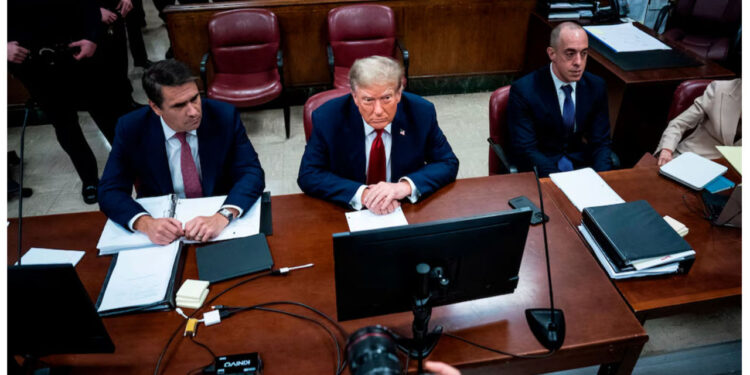Former President Donald Trump made his appearance in Manhattan criminal court on Monday, marking the commencement of the historic trial against a former U.S. president.
In April of last year, Trump entered a plea of not guilty to a 34-count indictment. He was charged with falsifying business records in relation to the alleged hush money payments made by his former attorney, Michael Cohen, to adult film actress Stormy Daniels. The purpose of these payments was to enhance Trump’s chances in the 2016 presidential election.
The historic trial, which is anticipated to span six to eight weeks, commenced on Monday with the commencement of jury selection. The process of jury selection is estimated to last for approximately two weeks.
Outside the courtroom, and throughout the day on his social media platform Truth Social, the former president maintained a defiant stance, criticizing the prosecution for their alleged political motives. However, inside the courtroom, he displayed a contrasting demeanor, reclining in his seat with folded arms, occasionally closing his eyes.
Voir dire, the process of selecting jurors, was delayed on Monday morning at the courthouse due to various pretrial procedural matters and scheduling concerns. Despite hundreds of prospective jurors showing up, the proceedings did not begin until late afternoon.
Judge Juan M. Merchan started off by dismissing a motion submitted by Trump’s legal team, which requested the judge to step down from the case. This request had been made multiple times before. Merchan deemed Trump’s suggestions that he harbored bias against him as baseless and stated that they would not entertain this topic any further.
Merchan dismissed Trump lawyer Todd Blanche’s claim that the jury questionnaire had an “asymmetry” that could potentially result in the selection of jurors who were strongly against Trump.
During the trial, there were also discussions about the admissibility of certain evidence. Blanche objected to the inclusion of evidence related to Trump’s interactions with the National Enquirer and his alleged affair with Karen McDougal, dismissing them as mere sideshows without any value. However, Merchan disagreed and supported the prosecutors, emphasizing the importance of establishing the necessary foundation for the case. It is worth noting that Trump has consistently denied having any affair with McDougal or Stormy Daniels.
Merchan explained his decision to not play the tape, stating that it was based on the prejudicial nature of the recording. He emphasized that the depiction of Mr. Trump, including his words, facial expressions, and overall presentation, would have a strong impact on the jury’s perception. Therefore, he deemed it inappropriate for the tape to be admitted as evidence.
The video will be allowed to be played by prosecutors, who can then read aloud the words spoken by Trump.
Prosecutors requested Judge Merchan to hold Trump in contempt and impose a fine of $3,000 for three purported violations of the restricted gag order in the case.
Prosecutors contended that the former president’s three posts breached the restrictions set forth in the limited gag order. These posts pertained to potential witnesses Michael Cohen and Daniels, as well as a member of the prosecution team. The order explicitly bars Trump from making any public remarks about individuals such as prospective jurors, attorneys involved in the case (except Bragg), and the families of both Merchan and Bragg.
The hearing on the matter has been scheduled by Merchan for April 23.
Around 2:30 p.m. ET, a group of 96 potential jurors entered the courtroom to commence the selection process. Some of them eagerly looked towards the former president, while one individual couldn’t help but giggle and raise her eyebrows. As Merchan introduced the case, the former president turned towards the audience, offering a brief smile with closed lips.
More than half of the potential jury members were dismissed from the panel after admitting that they couldn’t be unbiased in their decision-making. The remaining group underwent additional questioning, which included inquiries about their occupations, interests, preferred sources of news, and any preconceived opinions they might have had about Trump that could potentially influence their judgment. Two witnesses were disqualified, one of whom cited the trial’s scheduling conflict with his child’s wedding as the reason.
During the questionnaire, a bookstore employee residing on the Upper West Side expressed their thoughts on the criminal justice system.
He emphasized the importance of holding everyone accountable under the law, regardless of their position or title. “In my opinion, no one should be exempt from the law, whether they are a former president, a sitting president, or even a janitor,” he stated.
One juror, in particular, was excused from the trial, and as a result, no jurors were seated on Monday.

